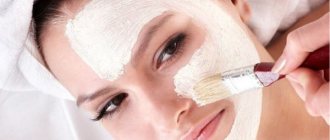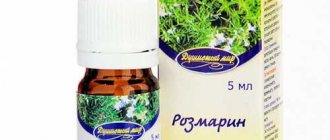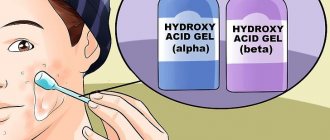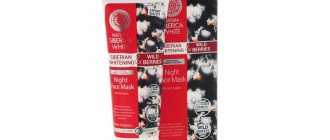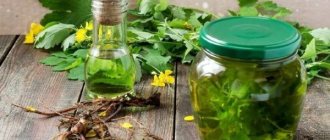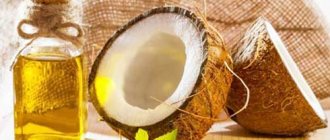Rosemary oil for the face is an essence used in cosmetology as an anti-inflammatory agent. The plant from which this ether is obtained is famous for its medicinal properties, due to which it is also used for medicinal purposes.
Previously, a sprig of rosemary was considered a talisman; it was often carried with them, believing that it would help preserve youth and health. The plant was also sometimes presented to newlyweds as a symbol of family well-being. These traditions have exhausted themselves, however, rosemary is still present in the lives of many people, but in a different form: in the form of an ether, which can be used in a variety of ways, helping to prolong the beauty of the face and body, as well as good spirits.
Types and chemical composition of rosemary oil
Depending on the geographical coordinates and growing conditions, this beneficial plant and, accordingly, the rosemary oil obtained from it for facial skin, has different chemotypes (chemical compositions):
- camphor - grows, for the most part, in Spain and is distinguished by its 30% content of antibacterial, vasoconstrictor and anti-inflammatory camphor,
- cineole &mdash, this Tunisian (sometimes Moroccan) chemotype gained its popularity due to the predominance (up to 55%) of the mucolytic, antifungal, antiseptic cineole,
- verbal &mdash, residents of Crimea and French Corsica know very well the softest of all rosemary CTs, because it is the combination of verbenone and alpha&mdash,pinene (up to 60%) contained in it that has a wonderful effect on the skin of the face.
Short story
The history of the shrub growing on the seashores of the Mediterranean and other countries of the world goes back to ancient times. The first mentions of culture date back to ancient times. Portugal is often called its homeland, but scientists do not have a clear and precise answer to the question of where rosemary first grew.
Then it was believed that the plant was able to protect against negativity, infectious diseases, and evil. Now this information has been scientifically confirmed, because the antiseptic properties of the plant have been proven.
Essential oil was first isolated in Medieval Europe. It has been used as a healing and sedative for many centuries by majestic people. Now such a valuable product can be purchased in a specialized store.
Manufacturing methods and shelf life
The low price of essential oil is also due to the most common and cheapest method of its production - steam distillation, based on the volatile properties of essential oils to rise with steam, and then condense and separate into pure ether and its hydrolate (water saturated with oil vapor).
This method is used both on an industrial scale and in handicrafts. But there are also homemade ways to make rosemary oil for the face:
- you need to pour 200 g of chopped rosemary leaves and sprigs with 200 g of clarified olive oil,
- After two weeks, squeeze it out and use it for the purposes you need.
Natural essential oil of rosemary for the face, transparent, light yellow or colorless, with a tonic, sweetish aroma with pronounced woody and camphor notes.
Rosemary etherol is afraid of direct sunlight, so it should be stored in a dark place at 16&minus.22 °C for no more than five years.
Important: due to the camphor contained in the essential oil, the container should be placed out of the reach of children and protected from fire.
Use in cosmetology
Due to its excellent antiseptic, stimulating and tonic properties, rosemary ether is widely used in cosmetology. It has a positive effect on the condition of the scalp. With its help they fight dandruff and hair loss. With regular use, the scalp is healed, the hair is softened, its follicles are strengthened, and excess greasiness disappears.
Cosmetologists advise using this oil to enrich ready-made cosmetics: creams, shampoos, hair masks, massage products. Rosemary essential oil also heals cracked elbows and feet.
Beneficial features
Rosemary oil is used not only to improve the condition of facial skin, but also for hair care, but you need to know that camphor and caeniol chemotypes are more suitable for oily and combination skin of the face and scalp, and verbal HT is more suitable for dry skin.
Our recommendation: when adding etherol to the composition of the active product, be sure to specify which chemotype was used, since active mineral compounds can cause dryness or irritation of the skin.
Application for oily and combination skin
Due to the high content of various beneficial components, B vitamins, linalool, camphene, borneol, limonene, alpha, pinene, terpineol, etc., rosemary oil enjoys well-deserved success among cosmetologists. Has the following healing properties:
- normalizes and regulates the functionality of the sebaceous glands and, accordingly, has a tonic effect on oily facial skin,
- with stable use, it effectively tightens pores, removing and preventing the appearance of comedones, acne, blackheads,
- the anti-inflammatory and antiseptic effect of the oil has a positive effect on problematic and teenage skin, acne heals quickly, and the normalization of the sebaceous glands prevents them from appearing again,
- Regular use of the oil has a good effect on the surface of the skin, irregularities and the effects of acne gradually disappear, and rough or rough areas exfoliate.
Use for dry skin
The light and delicate verbal chemotype is suitable for dry, aging and wrinkled skin types, providing the following positive effects:
- restores active blood circulation, showing smoothing and tightening dynamics of the skin condition,
- normalizes hydrobalance and increases skin elasticity, which allows you to actively fight wrinkles, jowls and other age-related features,
- the adrenomimetic properties of etherol overcome the effects of rosacea, prevent the appearance of spider veins, lighten pigment spots,
- softens the skin and evens out the complexion.
Limitation: the active components included in the ester can cause allergies, so first drop a little oil on your wrist. If irritation does not appear within 24 hours, then begin use.
Rosemary oil for facial beauty
Rosemary oil is an effective facial treatment in many cases.
Its use is especially popular for oily and problem skin. Many people are primarily interested in whether rosemary oil will help with acne? Yes, if you combine it with other remedies and proper nutrition.
Let's figure out what skin problems rosemary oil helps to cope with. The properties of rosemary essential oil allow you to cope with diseases such as:
- acne
- dermatitis
- boils
- purulent rashes
- rosacea
One of the main properties of rosemary oil is to reduce the secretion of the sebaceous glands. With constant use of oil, pores become narrower over time. In addition, rosemary has antiseptic and anti-inflammatory properties. After a couple of months of use, the skin becomes noticeably smoother and the complexion healthier. Inflammation goes away, the number of acne and oiliness decreases.
Rosemary oil is also suitable for dry and aging facial skin, because in addition to being anti-inflammatory, it has a fairly strong softening effect by stimulating blood circulation and increasing skin tone. Rough areas become softer and smoother, the skin becomes elastic. This, of course, will not get rid of wrinkles, but it will delay the appearance of new ones.
Rosemary oil for face, uses and contraindications
When using rosemary oil, you need to follow certain rules, strict adherence to which will allow you to get the maximum benefit without harming the skin and the general condition of the body.
- Adding to cosmetology bases - 4 drops per 5 mg.
- Massage, rubbing &mdash, 6:10.
- Inhalations &mdash, 4:10, no more than 4&minus.5 min.
- Baths - 50 drops of oil or 100 g of hydrolate.
- Oil without base and additives can only be used on rough areas of the skin.
- The use of rosemary oil on the face is allowed only after cleansing and mandatory high-quality moisturizing of the facial skin.
The strong odor and chemical elements contained in the etherol may cause negative consequences for consumers or others. Therefore, rosemary oil for the face should not be used:
- pregnant women,
- children under 10 years old,
- people with high blood pressure,
- those suffering from epilepsy or episyndrome,
Very important: in some cases, the smell of rosemary can have a stimulating effect on animals, so use the essential oil very carefully in their presence.
Recipes with rosemary oil for the face at home
The product is used in masks and mixtures according to skin type, the choice of base for which depends on the problem and the desired effect.
Recipes for dry skin type
- Moisturizing: peach oil (4 teaspoons) and rosemary (15 drops). Mix, apply to face, leave for 30-60 minutes. After this, you can remove the mask with a clean paper towel.
- Nutrition and improvement of complexion: ripe banana (1/2 pcs) + oils: avocado (5 ml), rosemary (2 drops) and lavender (1 drop). Stir, apply and wait 30 minutes. Then wash with warm water. Course: 2 rubles/week. in evening time.
Advice
For epidermis prone to dryness, it is useful to mix rosemary ether with flaxseed, almond, castor, and pumpkin base oils. But if you have excessively dry and sensitive skin, the use of etherol is not recommended at all.
Recommendations for oily and combination skin
- Mask for oily and combination skin against oily shine: grape oil (2 tablespoons) + rosemary ether (3 drops). The exposure time of the mixture is 20 minutes, after which the mask must be washed off with cool water without using soap.
- Alcohol lotion: white wine (1 l) + dry leaves: rosemary (10 g), mint (20 g) and chamomile (30 g) + salicylic acid (20 g). Mix all ingredients except ether and place in a glass bottle. Leave the mixture to infuse in a dark place for 2 weeks. Then you need to strain the liquid and add rosemary ether. Use the lotion daily, applying it with a tampon or cotton pad. Course: 15 days.
How to use rosemary oil for normal facial skin
Cleansing soap: soap base with goat milk (100 g) + esters of lavender, geranium and rosemary (2 drops each). Melt the soap base in a water bath and cool to body temperature. Add ethers, pour it all into special forms and wait for it to harden. Wash with soap every day - morning and evening.
Anti-aging masks
- Olive : yolk + olive oil (2 tbsp.) and rosemary (3 drops). Session duration: 15 minutes, after which wash with warm water.
- Clay: water + green cosmetic clay (1/2 tablespoon) + rosemary ether (4 drops). Dilute the clay with water until creamy, add ether. Keep the mask on your face for 20 minutes. Then carefully, without stretching the skin, rinse off the mask with cool water.
Rosemary oil for face for acne and blackheads
For acne: 1) rosemary ether (1 drop) + Aevit vitamins (1 capsule). Open the capsule, squeeze out the contents, add the essential component. Apply to the area of skin where there is a problem, leave for 15-20 minutes. Then remove any remaining product with a clean napkin; no need to wash your face!
2) rosemary ether (1 drop) + black cumin oil (10 ml). Apply the mixture locally to inflammation before going to bed.
For information
If in the second recipe you replace cumin with oil extract of milk thistle or rose hips, then this mixture can be used to get rid of scars and spots after acne.
Compress for acne and marks from them: olive oil (2 tablespoons) and rosemary (5 drops). Prepare a cotton napkin or cotton pad, soak it in the oil mixture and apply it to the problem area. Leave to act for 10 minutes. After removing the compress, rinse your face with cold water. Course: 2 rubles/day for a month.
Rosemary oil for the face for rosacea (spider veins)
- Enrichment of skincare cosmetics: care cream (single dose) + rosemary ether (2 drops). Mix and apply to the face in areas of severe rosacea every evening, before bed.
- Anti-inflammatory mask for rosacea: wheat germ, milk thistle, grape or sesame oils (optional - 1 tablespoon) and rosemary (2 drops). Exposure time: 15-20 minutes.
- Tonic: linden decoction (70 ml) + rosemary ether (7 drops) + vitamin E (5 ml). Strain the linden broth and add the remaining ingredients. Pour into a dark glass container. Use as a regular toner, wiping cleansed face morning and evening. Next is the usual moisturizing/nourishing cream.
Mask recipes
Cleansing (oily skin type)
- Mix 2 tbsp into a paste. spoons of green clay + 5 drops of ether + 2 tbsp. spoons of water.
- Apply to a moistened face for 10&minus, 15 minutes.
- Rinse thoroughly and lubricate your face with nourishing cream.
Rejuvenating
This mask is suitable for those with dry skin types.
- We connect 2 tbsp. spoons of almond oil + chicken egg yolk + 4 drops of essential oil.
- Distribute over damp skin (do not touch the area under the eyes and eyelids).
- After 10 minutes, rinse off and apply the nourishing product.
Lifting and smoothing face mask with rosemary oil
- Add 4&minus.5 drops of rosemary essential oil to 1 teaspoon of base (ethers of peach, cedar, flax).
- Apply to a damp face for 15 minutes.
- Carefully remove with a wet sponge and lubricate with moisturizer.
Ointment to remove the effects of skin diseases
- You need to mix 2 drops of essential oil with 1 teaspoon of rosehip oil or cocoa.
- Lubricate topically, only problem areas, but not more than 2 times a day.
Remedy for pigmentation and rosacea
- We make a mix by adding 2 drops of ether to a teaspoon of sea buckthorn oil.
- Apply to the skin 2&minus.3 times a day, but in total no more than one week a month.
Our recommendation: Rosemary essential oil's light texture mixes well with other types of oils, so don't be afraid to experiment with mixes while remembering to follow the rules above.
Properties
Rosemary essential oil for acne spots has a rich composition. It includes the following components:
- Organic acids.
- Tannins.
- Bitterness.
- Resins.
- Microelements.
- Alkaloids.
Thanks to these components, the product is widely used in medicine and cosmetology, as it has many useful properties. Rosemary oil is especially effective when used as a remedy for post-acne. In this case, the product exhibits the following properties:
- Normalizes the production of melanin in the skin. If treatment is incorrect or delayed, dark pigment (melanin) accumulates in the skin at the site of the pimple, which manifests itself as post-acne. The use of rosemary oil leads to a decrease in pigment production, which helps to quickly get rid of the problem.
- Normalizes intracellular metabolism. This speeds up the process of penetration of beneficial substances into the cell and removal of harmful decay products and toxins from it.
- Improves blood circulation in the area where acne is located, saturates the damaged area with oxygen.
- Has a brightening and smoothing effect.
- Evens out skin tone and returns natural shade.
- Helps reduce swelling left after acne treatment.
- Tones the skin, soothes and whitens it.
- Acts as an antiseptic, preventing the re-development of inflammation and the appearance of a rash.
- Softens skin that has become rough after acne treatment. This is especially true for large areas of damaged skin (during adolescence).
Due to its natural properties, rosemary oil serves as an excellent cosmetic product for the treatment of post-acne, improving the external condition and eliminating the problem inside the skin.
Reviews from real consumers
Elena, 33 years old, Perm
“I’ve been suffering with the consequences of acne for so many years – it’s impossible to describe. I don’t have enough money for polishing, and my face is completely uneven. I’ve been using rosemary oil for six months now, and you know, it’s true that my skin has become smoother and smoother. I am very happy. And the price is low."
Igor, 41 years old, Pyatigorsk
“I had seborrhea of the head. I tried expensive shampoos and pharmacy masks. My wife brought rosemary oil for her face; the reviews say good things about it. She offered it to me too. Although I no longer believed in anything – they simply didn’t buy dark clothes. I apply it twice a week, it helps. And the wife smears her face. She’s already beautiful to me, but she’s become even better.”
In this article we provided evidence that nature came up with everything long before us and for us. So why not take advantage of her natural gifts? Rosemary oil for the face is a real treasure that will allow you to forget about old age for a long time and improve your health.
Reviews of acne remedies with rosemary
Many girls have problem skin. And on various websites and forums they share their secret of success in the fight against pimples, acne and blackheads.
“I have been trying to deal with my problem for many years. My acne hasn't gone away since I was in school. I have already tried many ointments and creams, but there was no result. And by chance I found an article on the Internet about rosemary oil. I didn't believe it could help! If expensive medications do not help, then the oil will definitely not be able to cope with acne. But I was wrong. After exactly a week of using rosemary oil and olive oil, the result exceeded all my expectations. Acne is gone! The skin began to look fresh and smooth. Now I can't stop making masks with this amazing oil. I recommend it to all girls with problem skin.”
Anastasia, 27 years old
“I have oily and combination skin. I can’t apply makeup properly because subcutaneous fat constantly appears on my face throughout the day. Creams are not suitable for such skin, and I didn’t know what to do. I decided to go to a cosmetologist. He advised me not to overstrain my skin with creams and emulsions, but simply use natural products. I chose rosemary oil. The cosmetologist suggested several recipes for masks, which necessarily include rosemary. These masks fight acne, oiliness and blackheads. And they helped me. Exactly three weeks later, all my acne disappeared, and the oily sheen no longer appears. Rosemary oil is a unique remedy that simply cannot be replaced!”
Victoria, 17 years old
“At a young age, I constantly squeezed pimples and blackheads on my face. I thought that there would be no marks or scars, but, unfortunately, I was wrong. After a while, terrible pigment spots and small scars appeared. I didn’t do anything, hoping that it would go away on its own. But years passed, and the scars and spots did not disappear. I began to think seriously about this problem. And on one of the women’s forums I read that rosemary oil helps remove scars very well. Since my scars are very noticeable, I use the oil in its pure form. I've been spot-applying it in the morning for a week now. The skin began to look healthier. I hope that after a while my problem will be solved and rosemary oil will not let me down.”
Nadezhda, 30 years old
“Acne is a constant problem for me. I never thought of doing anything about them, but as I grew up I realized that the problem would not be solved on its own. Ointments in the pharmacy are very expensive and I found an alternative way - acne oil. Of all the lists, rosemary seemed to me the best. And I was absolutely right. After just a week and a half, the skin looks almost perfect. The acne is completely gone. Now I use oil not only when a problem already exists, but also for preventive purposes.”
Ivan, 22 years old
Rosemary: benefits and harm for the skin
Rosemary oil is widely available in pharmacies, as well as from manufacturers of natural cosmetics. High-quality essence has undeniable benefits for acne and post-acne.
Helps:
- Destroy pathogenic microorganisms;
- Eliminate the inflammatory process;
- Increase the ability of tissues to regenerate;
- Improve local immunity;
- Narrow pores;
- Reduce swelling;
- Regulate sebum production;
- Get rid of isolated acne elements;
- Cope with scars, pigmentation, small scars;
- Restore moisture balance in the dermis;
- Reduce the severity of wrinkles;
- Achieve soft skin;
- Normalize blood microcirculation;
- Accelerate the healing of chronic psoriasis, dermatitis, eczema.
Pure ethers cannot be used: they can cause itching, redness and even burns. Rosemary oil is intended to enrich finished cosmetics or add to basic foundations. The pronounced smell of undiluted essence also provokes:
- Anxiety;
- Blood pressure surges;
- Dizziness;
- Insomnia when inhaling the aroma before bedtime;
- In rare cases, seizures.
Contraindications for use
Despite the large number of medicinal properties, rosemary oil has contraindications.
It cannot be used:
- pregnant or breastfeeding women;
- in the presence of individual intolerance;
- people suffering from arterial hypertension;
- if you have epilepsy or a tendency to seizures;
- insomnia or circadian rhythm inversion.
You should also use rosemary oil with caution in children under 7 years of age. At this age, the body is extremely sensitive to external stimuli.
Traditional medicine recipes
Leaves, seeds, flowers and even shoots of rosemary have medicinal properties. They can be used fresh and dry. There are a large number of traditional medicine recipes for the treatment of various diseases, which are described below.
- Chronic gastrointestinal diseases. You need to drink tea or rosemary infusion. To do this, brew 3-4 tablespoons of herbs in 400 ml of water overnight. Drink in small sips over the next day. This recipe is contraindicated for diseases of the pancreas.
- To maintain immunity during the recovery period. 1 tbsp. l. Pour a cup of boiling water over dry rosemary leaves. Cover with a towel and let sit for half an hour. Strain and drink 3 times a day, 0.5 cups.
- Thrush, throat diseases. Infusion for rinsing and douching: 2 tsp. crushed leaves, pour a glass of boiling water, leave for 2 hours and use as intended.
- Increased immunity, pain in muscles and joints, skin diseases. Rosemary bath: pour 100 grams of herb into 2 liters of water and boil. Leave for half an hour, pass the solution through cheesecloth and pour into a bath of warm water.
- Heart pain, neurosis, amenorrhea in women, stomach colic. Grind the leaves, take 2 tbsp. l. raw materials and pour 0.25 liters of boiling water. Boil over low heat for 20 minutes. Drink the strained broth 3 times a day half an hour before meals.
- Diseases of the genitourinary system in men, impaired potency. Take a tablespoon each of rosemary, sage, immortelle and birch buds. Pour the collection with a liter of boiling water, close the lid for 3 hours. Drink the strained broth 4 times a day 20 minutes before meals.
- Inhalations for bronchitis. Pour a liter of water into an enamel container. Before boiling, add 1-2 sprigs. Bring to a boil and immediately turn off the heat. Place the container on the table, covered with a towel, breathe in the steam alternately: first with your nose, then with your mouth. Inhalation duration is 10 minutes.
Alcohol tinctures are also effective for many diseases. The most popular recipes are presented below.
- Neurosis, low blood pressure, flatulence, loss of appetite. Place 10 grams of crushed leaves in a glass container. Pour 100 ml of vodka and place in a cool, dark place for 10 days. Afterwards, filter the tincture and take 3 times a day, 20 drops, previously diluted in 30 ml of water, half an hour before meals.
- Rheumatism. Pour 50 grams of fresh leaves into 250 ml of 70% alcohol. Place the composition in a cool, dark place for 10-12 days. The resulting tincture is used for rubbing or as compresses on sore spots.
- Infections of the oral cavity, respiratory tract, intestinal dysfunction. Dissolve 3-4 drops of rosemary essential oil in 250 ml of 50-60% alcohol. 1 tsp. Pre-dilute the resulting tincture with a glass of water and take 50 ml 3 times a day.
The list of effective mixtures containing rosemary essential oil is extremely wide. A few specific recipes give some idea of the rich potential of this product.
